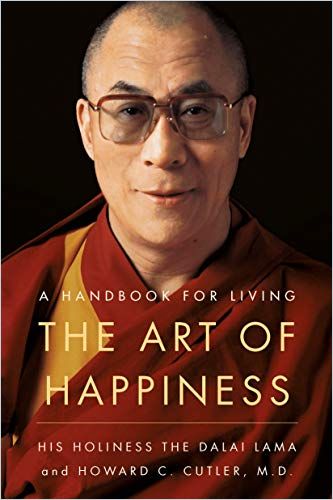Everyone has the right to be happy. But how do you achieve happiness? Tibet’s spiritual leader, the Dalai Lama and psychiatrist Howard C. Cutler conclude that with the right mind-set and practices, all people can find happiness.

Happiness Comes from Within
“The purpose of our life is to seek happiness,” says Tibet’s spiritual leader, the Dalai Lama. In the latest edition of this helpful, accessible text, psychiatrist and speaker Howard C. Cutler synthesizes stimulating conversational exchanges he enjoyed over many years with the 14th Dalai Lama, Tenzin Gyatso. The book richly connects Buddhist philosophy and wisdom with the latest positive psychology research emerging from the “Happiness Revolution.” The authors’ guidance on dealing with the challenges of everyday life proves as relevant today as when it was first published in 1999.
Compassion and Kindness
Countless studies, Howard Cutler writes, show that happy people tend to be healthier, have stronger immune systems, connect better with their partners, experience better mental health, show greater resilience, cope with trauma better, have a lower likelihood of developing cardiovascular disease and may live up to a decade longer than their unhappy counterparts.
There is an inextricable link between one’s personal happiness and kindness, compassion, and caring for others.The Dalai Lama and Howard Cutler
Buddhists can contribute to the understanding of human happiness, as they’ve spent 2,500 years practicing techniques that help people train their minds and cultivate inner strength. Buddhists show compassion and kindness to others, which increases their own happiness levels.
Cultivate Your “Buddha Nature”
Being happy, the authors emphasize, depends more on your state of mind than external factors, such as money, fame or your vision of ideal love. Many wealthy people discover they are unhappy when they lose their socioeconomic status because they haven’t cultivated self-worth, which comes from connecting empathetically with others. Constantly comparing yourself with those you view as more successful, wealthy or attractive will fuel frustration and envy. The answer, the authors say, is to develop inner contentment to combat the excessive desire for more, and practice gratitude and appreciation for what you have.
We don’t need more money, we don’t need greater success or fame, we don’t need the perfect body or even the perfect mate – right now, at this very moment, we have a mind, which is all the basic equipment we need to achieve complete happiness.The Dalai Lama and Howard Cutler
The doctrine of “Buddha Nature” holds that every human being is innately gentle, not aggressive. Infants are naturally affectionate with their mothers and the human body is healthiest when people display affection and warmth instead of negative states such as fear and agitation. Solve conflicts by tuning in to this innate Buddha Nature.
Overcome Loneliness
Those who lack an intimate relationship, either with a close friend or spouse, have triple the likelihood of dying of heart disease within five years than people who nourish these connections. Cutler and the Dalai Lama urge you to create close, intimate relationships with as many people as you can. However, they add, these should be authentic friendships – not those that would wither if you lost your status, power, wealth or position.
Learn to recognize when you idealize a love interest. Romantic relationships rooted in fantasy will result in feelings of frustration and disappointment. Ensure your relationships can survive long-term by rooting them in a foundation of mutual respect, compassion and affection.
Embrace Impermanence
Cutler and the Dalai Lama counsel you to cease viewing suffering as an abnormal state you must avoid or reject. Instead, observe another person’s cruel actions as you might a “silent wind,” and react without attachment. You can’t always control unwanted external events, but you can control how you choose to respond. Take personal responsibility, the authors advise, and don’t nurse excessive feelings of guilt and self-loathing.
The torture of guilt is in thinking that any problem is permanent. Since there is nothing that doesn’t change, however, so too pain subsides – a problem doesn’t persist. The Dalai Lama and Howard Cutler
If feelings of guilt weigh you down, it’s likely because you view your problems as permanent, and believe your mistakes are irreparable. Know that all life is impermanent and that everything exists in a state of flux. Accept change rather than resisting it.
Finding Balance
If you seek extremes, whether accumulating vast material wealth or physical thrills, you will create greater suffering and harm yourself. Cutler and the Dalai Lama recommend you focus on finding balance. Avoid binary thinking, such as switching between feeling arrogant and worthless, to cultivate healthier emotional and mental states.
Monitor your negative thought patterns and strive to correct cognitive distortions. For example, counteract feelings of failure with success stories, such as “I have worked hard to raise two children,” or “I have been a good friend.” Remember that self-love is your natural state; every individual wishes for their own happiness.
Honesty, Patience and Tolerance
Hostility elevates an individual’s heart disease risk, perhaps even more so than high blood pressure or cholesterol levels. The Dalai Lama considers anger and hatred the “greatest evils.” Combat feelings of hatred by deliberately cultivating tolerance and patience. Both research and Buddhism suggest that the best approach to dealing with anger is to logically analyze it from a place of calm.
Fearless and honest self-appraisal can be a powerful weapon against self-doubt and low self-confidence.The Dalai Lama and Howard Cutler
The Dalai Lama believes people should learn to let go of day-to-day anxieties. You don’t need to feel ashamed or embarrassed by failure if you make a genuine effort, rooted in altruism, to fulfill a higher purpose, and if you’ve been honest with yourself and others about your capabilities.
Reframe Painful Experiences
Painful experiences are opportunities for you to gain a better understanding of others’ pain through the lens of your own suffering. The authors refer to psychiatrist Viktor Frankl, who experienced brutal, inhumane treatment in Nazi concentration camps. Frankl carefully observed who survived and who perished. He found that those who persisted weren’t necessarily the strongest or youngest; their survival hinged on their ability to connect to a greater sense of meaning and purpose.
If you’re struggling to connect to a higher sense of meaning and purpose, Cutler and the Dalai Lama recommend developing “basic spirituality” – accepting goodness, kindness, caring and compassion as core human qualities. In addition, practicing meditation can lead to a sense of luminosity and clarity – your mind’s true nature.
Important Teachings
The beauty of the advice in this book edition springs from its simplicity. Ultimately, peace of mind and genuine happiness aren’t contingent on external circumstances; they require only the right mind-set and practices. In that sense, everyone can access calmness and joy – once they know how. The book shows that you don’t have to become a Buddhist to become happier, but you can learn a great deal from Buddhist wisdom. If you are searching for answers on how to overcome loneliness, feel greater self-worth, experience more satisfaction and fulfillment, and seek freedom from negative emotions, look no further than the teachings of this enlightening work.
Readers might wish to seek out the authors’ follow-up collaboration, The Art of Happiness in a Troubled World. Other books by the Dalai Lama include The Book of Joy: Lasting Happiness in a Changing World (with Desmond Tutu) and How to Practice: The Way to a Meaningful Life.





